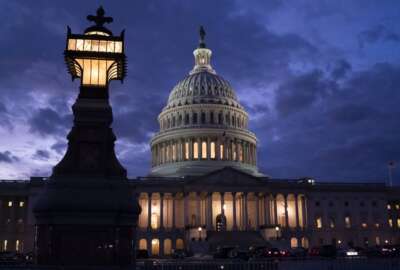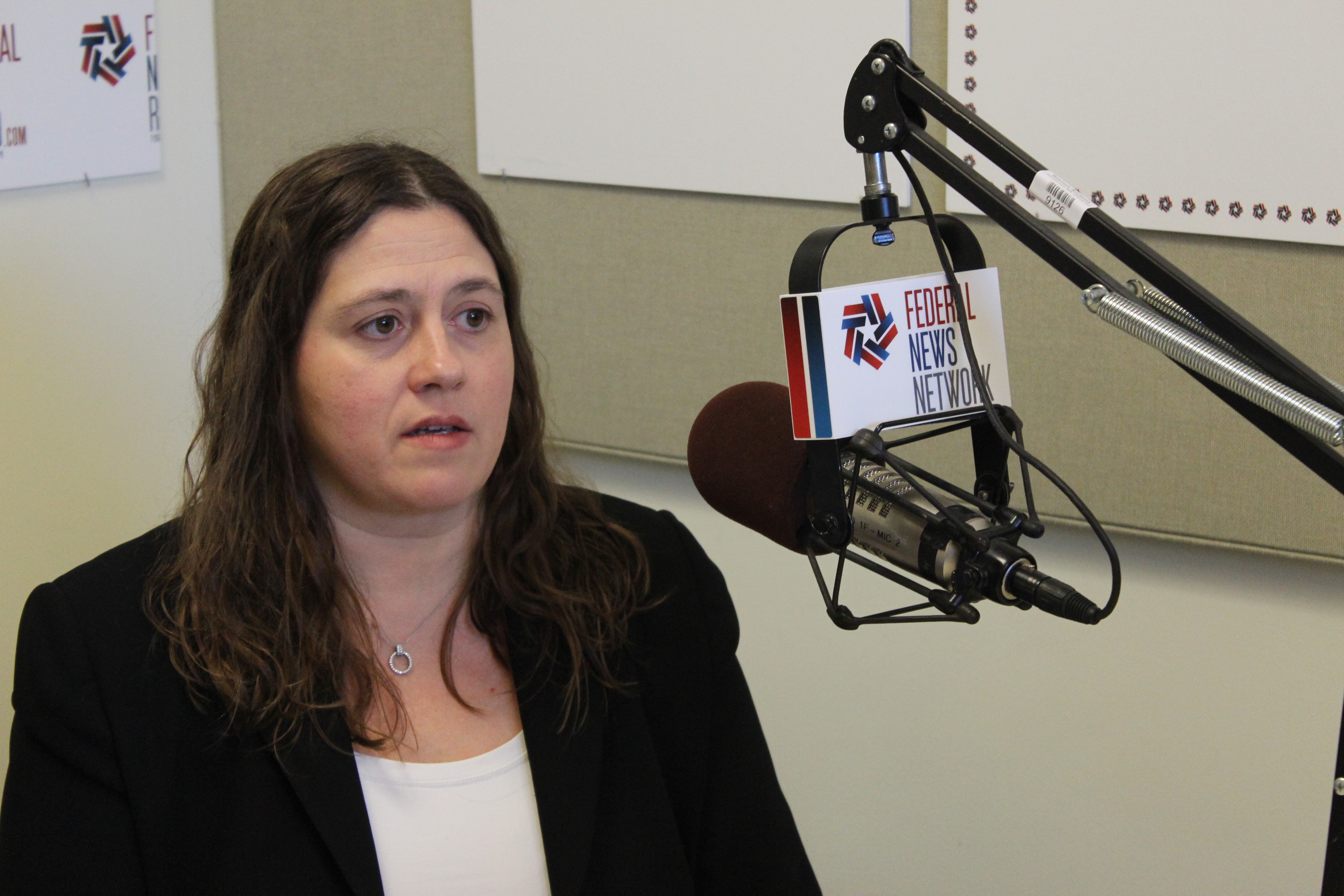
Court rules against feds getting monetary damages when they go unpaid in government shutdown
A federal appeals court ruled last week that feds who work without pay during government shutdowns are not entitled to monetary damages. The Court of Appeals for...
Best listening experience is on Chrome, Firefox or Safari. Subscribe to Federal Drive’s daily audio interviews on Apple Podcasts or PodcastOne.
A federal appeals court ruled last week that feds who work without pay during government shutdowns are not entitled to monetary damages. The Court of Appeals for the Federal Circuit found the government is not actually in violation of the Fair Labor Standards Act in government shutdown situations. That’s because another law, the Antideficiency Act, effectively makes it illegal to pay employees when their agencies don’t have appropriations. Or so the court majority’s reasoning went. The Federal Drive with Tom Temin talked with Heidi Burakiewicz, an attorney for some of the federal plaintiffs who have been fighting for damages ever since the 2013 government shutdown.
Interview transcript:
Heidi Burakiewicz: Unfortunately, the majority panel, two of the judges that heard the Appeal, determined that FLSA was not violated when the federal government failed to pay federal workers on their regularly scheduled pay day for working during the government shutdowns.
Tom Temin: Right. They said that … well, did they say that? Or did they say that the government had to choose between either the Fair Labor Standards Act — FLSA — or the Antideficiency Act? Therefore, it was in an impossible situation? So it chose the Antideficiency Act?
Heidi Burakiewicz: First of all, let me say we obviously disagree with the majority decision. We think that the dissent has the better of the legal arguments. I think that what you’re talking about is the legal analysis that the court applied in order to get to the final holding that the FLSA was not violated under these circumstances, which obviously we disagree with.
Tom Temin: Sure. And review for us the numbers of people, there were two cases here. And I thought that the government was in the midst of calculating amounts due for the earlier shutdown, that is, the 2013 shutdown. And the most recent one was a kind of a copycat case, if you will, for lack of a better word. So is anybody going to get anything with respect to liquidated damages, as the ruling stands now?
Heidi Burakiewicz: I certainly hope that employees … we’re still pursuing our options. I’m not ready to give up fighting on behalf of these federal workers. So there were two shutdowns that are covered by the court’s decision. There was a shutdown in October of 2013. And then there was a 35 day government shutdown from December 2018 to January 2019. The trial court had ruled in our favor, entered judgment in plaintiffs’ favor in 2013. And the government, we worked with them and went through the process of calculating damages for the thousands of plaintiffs who had joined that lawsuit. That case, the government appealed to the Federal Circuit Court of Appeals. They also took an interlocutory appeal on the cases stemming out of the 2018-2019 shutdown. So all of the cases were heard before the same three judge panel on the same day. And that’s why the decisions came down, as they did.
Tom Temin: All right. And what have you heard from the plaintiffs you’ve been representing here? What are they saying?
Heidi Burakiewicz: Obviously, everyone is disappointed, I have to say. Plaintiffs were reaching out to me last Wednesday when they heard the news — remarkably, checking to see how we were doing and to thank us for taking on this fight for them in the first place. I am blessed to work with such wonderful clients. I was already committed to advocate on their behalf and we’re not ready to give up.
Tom Temin: And do you have a course of action that you’ve planned on yet? What are your options?
Heidi Burakiewicz: We are still deciding what the next best steps are. There are several options that include you can ask the court of appeals to rehear the case en banc, meaning all of the judges hear the case, not just the three judges that heard the appeal that was ruled on last week. The Supreme Court is an option. We’re considering all of our options.
Tom Temin: And just, if you would, do you have an idea of the average amount of liquidated damages, if you took all of them divided by the number of plaintiffs in each of the cases, the 2013 and the 2018. How much money is involved for each individual?
Heidi Burakiewicz: It varies greatly. I the 2013 case, there were some — we’ve talked about this before — there were only five days in 2013, where employees were not paid on time, not even a full work week. So as a result, there’s some plaintiffs depending on, if they worked overtime or not, if they got paid for the beginning of that pay period before the shutdown started, that don’t have any liquidated damages. There’s other plaintiffs that just from those five days have thousands of dollars in liquidated damages that are owed to them. Fast forward to the 2018-2019 shutdown — 35 days, four full weeks — and it’s $290 per person per week is the minimum wage violation, which comes out to $1,160 plus the full value of overtime. And so there’s some plaintiffs, like I said, even just from that five days in October 2013, who are owed thousands of dollars, $2,000-3,000. People worked extensive amounts of overtime during the shutdown. And again, I can’t emphasize enough. These are the federal workers who keep the country running. They’re the people that keep us safe, make sure our food is safe to eat. And they went to work not knowing when they were going to get their next paycheck, how they were going to afford their medications, how they were going to pay for transportation to get to and from work, how they were going to put food on the table for their kids.
Tom Temin: We’re speaking with Heidi Burackiewicz of the law firm Kalijarvi, Chuzi, Newman and Fitch. And I asked the question about the amounts because as you say, in some cases, it’s substantial. But if you look at it in the grand scheme of things, isn’t there a practical matter of would this just be a Pyrrhic victory if you keep forging on given the legal costs and the time involved? So I know you haven’t decided yet. But is that part of the calculus as to whether this is all worth it in the long run?
Heidi Burakiewicz: In October 2013, when we filed this case, the five means plaintiffs in October 2013 — and when I filed this case, there was a lot of people who said this couldn’t be done, that there wasn’t an FLSA violation — and unanimously, those five plaintiffs wanted to do this, because they wanted to make it a better place for employees to work in the federal government. No more shutdowns. We wanted to call attention to the plight of the federal worker. And when you fast forward to 2018-2019, you see exactly what people went through: 35 days without a paycheck. And no one knew when it was going to come to an end. So for our plaintiffs, you asked a moment ago, how my clients, the plaintiffs are responding to this, and obviously, very disappointed, but what I heard from last last week was “at least we tried, and we’re not giving up.” This is something that if there is another lack of appropriations, we want the government to stop and take consideration of what’s going to happen to the federal workforce, what’s going to happen to these employees. And there really is a way where the Antideficiency Act and the FLSA can coexist. And that’s something that we want to make sure happens going forward.
Tom Temin: Just to be clear, you believe there is a way they can pay people during a shutdown and still not violate the Antideficiency act?
Heidi Burakiewicz: Absolutely. In 2013, the Department of Defense was one of those agencies that was affected by the lack of appropriations. So Congress passed the Pay Our Military Act, so that the military and the civilian employees at the Department of Defense who support the military would be paid during the lack of appropriations. And there’s absolutely nothing preventing the government from taking a similar course of action for those essential government workers who have to keep going to work, who have to expend their funds in order to get to work. They were not able to go out and get a part time job in order to pay for food to put on their kids’ tables. And so that’s exactly what we want to prevent from happening again.
Tom Temin: In other words, you’re putting indirect leverage through these suits on Congress to be able to enable that as they did for the Defense Department.
Heidi Burakiewicz: That’s just one of several courses of action that can be taken to make sure that the employees’ FLSA rights are not violated.
Tom Temin: And just out of curiosity, you have been pursuing this for a long time, and I know your passion for this case, but law firms have to be paid at some point, too. I mean, it’s not like you work for free. So how are you sustaining this in that sense?
Heidi Burakiewicz: Well, we did this case on a contingency fee from the beginning. I think I told you a long, long time ago in October 2013. I was working on a case at a federal penitentiary in Atwater, California where a correctional officer had been brutally murdered. And my hearing came to an end. We couldn’t finish week two because there was a lack of appropriations, my opposing counsel ordered to go home. And it was heartbreaking to know, working there, being there, I couldn’t talk to the staff without seeing in their eyes the pain of what they had went through when their coworker was so brutally murdered. And I knew that they had to continue to go into work. And they were going to go into work and not know when they were going to get paid again. And it caused tension between the inmates and the staff within the institution. And I was just greatly worried about them. So this has been a labor of love. Truly, we’re doing it on a contingency fee basis. And as I said before, we’re disappointed with the decision but I’m not ready to give up yet.
Copyright © 2025 Federal News Network. All rights reserved. This website is not intended for users located within the European Economic Area.
Tom Temin is host of the Federal Drive and has been providing insight on federal technology and management issues for more than 30 years.
Follow @tteminWFED
Related Stories





